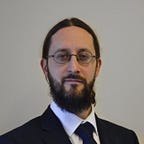Interview with Dr Emre Kazim
This is part of a series of interviews with academics. Find out more about Woolf and the academics who are driving research forward at woolf.university.
1. Emre, your current research focuses on political normativity, secularism and the history of early modern ethical thought. Could you comment on the main objectives of your research and what motivated you to pursue it?
Moral and ethical questions can be approached in a number of ways. One way to investigate such questions is to probe what people think and why they think it, this can be thought of in terms of a descriptive account. Another way to investigate such questions is to ask what one ought to believe, what is the actual moral imperative in a particular situation or ideal situation, this can be thought of in terms of a normative account. My research focuses on the relationship between the normative and the descriptive, by probing how our normative demands may be affected by a particular social-political reality.
I look at this question primarily through the philosophy of Kant, and subsequent critiques and responses to his work. This is because Kantian philosophy explores these questions and is a rich resource. Although Kant is a historical figure, the themes and discussions are relevant to social and political debates and changes today.
2. Tutorial teaching lies at the centre of Woolf education. In your view, how does tutorial teaching facilitate training students interested in the complex questions of early modern philosophy and history?
My approach to teaching philosophy is to help develop within the student two key skills. The first is the form, namely the ability to write, present, and discuss philosophical ideas. The second is the content, namely the ability to think conceptually and philosophically about subjects. It is my belief that students can learn to write and present through practice and receiving feedback on their work: tutorials ensure that this occurs. However, more importantly, tutorials facilitate and expose the student to philosophical ways of thinking and arguing. As such, tutorials must be thought of as more important than lectures themselves.
3. What opportunities from the Woolf platform most excite you as a teacher and scholar?
Traditional educational institutions have certain drawbacks which are mitigated by the fact that at the very least they provide a certain, publicly discernible, standard. For instance, students and subsequent employers can know that various standards have been met just by reference to the particular university/institution that the education was provided by. The Woolf platform does away with the drawbacks of the traditional educational institutions while maintaining publicly accessible standards. It is exciting to be involved with such an innovative and novel approach to education, which provides a flexibility and level of access unparalleled in traditional educational institutions.
Learn more about the Woolf project and the people involved on the Woolf website.
